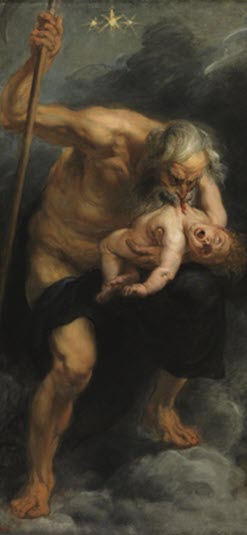Greek Titans in Greek Mythology were the 12 children of the Father of Heaven, Uranus, and Mother of Earth, Gaia. Uranus and Gaia had 6 sons known as Titans and 6 daughters known as the Titaness.
According to the legends written by the Greek poet Hesiod in his Theogony, one of the oldest pieces of Literature of Ancient Greek, these Titans were responsible for the castration of Uranus.
Uranus never liked his children; he would hide them in a dark place as soon as they were born. So Gaia, his wife, set a plot to castrate him with the help of her children.
She requested her sons to accept the plot, and only Cronus agreed to the plot. He became the main one to be involved in overthrowing Uranus. He had help from the other three brothers, Hyperion, Lapetus, Coeus, and Crius.
These four brothers helped him by standing on four corners of the world as pillars and holding their father fast.
Hyperion was on the East, Coeus on the North, Crius on the South, and Iapetos on the West. Cronus was in the middle castrating Uranus with a sickle.
This article lists the 12 Greek Titans in detail.
12. Oceanus – Titan of the Oceans, Rivers, and Freshwater
Content
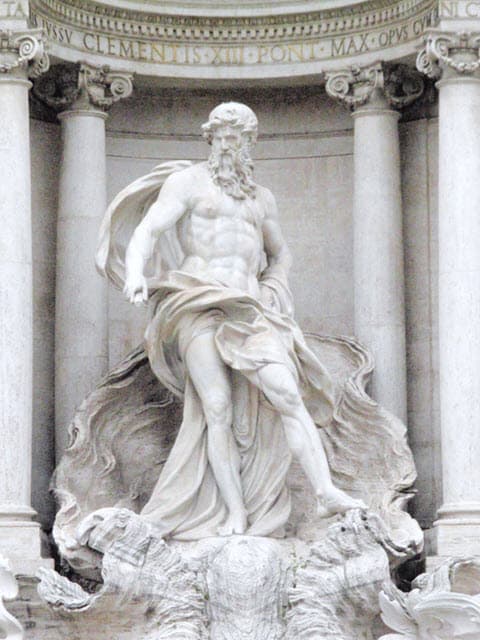
Greek Titan, Oceanus was the eldest son of Uranus – the God of Heaven and Gaia – the Goddess of Earth. He was associated with Oceans, Rivers, and Freshwater.
He married his sister, Tethys, and was father to 6000 children, out of which 3000 were Potamoi, the river gods, and the remaining 3000 were Ocanids, the daughters.
The River gods included Achelous River, Alcmaeon, Alpheus, and Scamander, who was known for fighting on the side of Trojan during the Trojan War. The Ocanids included Metis, Eurynome, and Doris.
The Titan of freshwater was depicted as a serpent with a long tail or sometimes as fish with a long tail, and he is the only child who did not participate in the fight against his father, Uranus. Also, he did not take part in Titanomachy, where Zeus overthrew Cronus.
11. Coeus- Titan of the North, Intellect, and Rational Mind
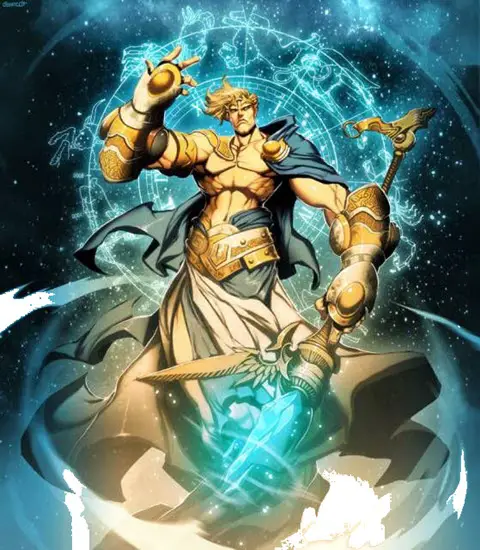
Coeus, another son of Uranus – the Father Heaven and Gaia – the Mother Earth was the Titan associated with Intellect, Rational Mind, and the Northern corner of the Sky.
Like his brother, Oceanus, he married his sister, Phoebe, and was father to the Greek Goddess Leto, Lelantos, and Asteria.
Despite being a Greek Titan, he had no active role in Greek Religion but was honored to be responsible for the knowledge of the cosmos and his wife, Phoebe.
The Titan of Intellect was one of the four brothers involved in overthrowing father Uranus and was imprisoned by Zeus in the deep pit, Tartarus. The brothers were defeated in the famous Titanomachy.
The historians mentioned that Coeus tried to escape from the prison but was forced back by Cerberus, a multi-headed dog guarding the prison.
10. Crius – Titan of the South and constellations
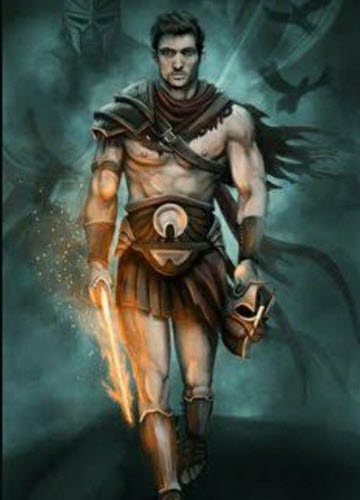
Crius, the son of Uranus and Gaia, was the Titan associated with Constellations and the Southern corner of the Sky. ‘Krios’ in Greek meant ‘ram,’ so he was associated with Aries, the first constellation seen in the Sky.
Crius was married to his half-sister, Eurybia. She was the daughter of Gaia and Pontus. They had three children together named Pallas, Perses, and Astraios. His children had animal-like features as Crius was related to ‘ram.’
He was one of the four brothers who helped Cronus in Castrating their father, Uranus. He was responsible for pulling his father from the Northern corner.
Zeus had him imprisoned in the Titanomachy in Tartarus and his other brothers. Zeus had them imprisoned as he believed they were a threat to his throne.
9. Hyperion – Titan of the East and Heavenly light
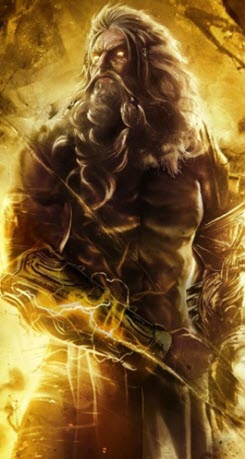
Hyperion, the Titan of the East, was the son of Heaven’s father Uranus, and Earth’s mother, Gaia. He was associated with heavenly light and the Eastern pillar.
Hyperion meant watcher from above, so he was responsible for always watching and taking care from above. Also, he is the only Titan to cause the order of Cycles of the Sun and the Moon, resulting in days, nights, and even months.
Like all his brothers, he married his sister Theia and was father to Helios, Semele, and Eros. He was one of the 4 brothers involved in overthrowing his father, Uranus. Zeus had him deposed in Tartarus alongside his other brother as he saw them as a threat to his throne.
8. Iapetus – Titan of the West, craftsmanship, and death
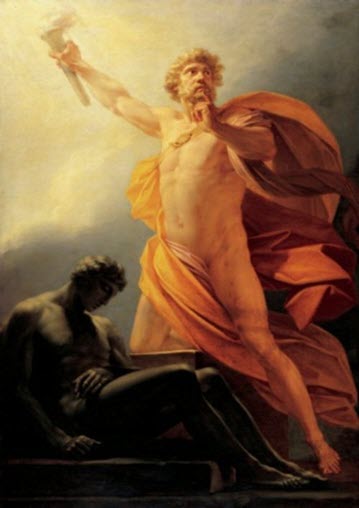
Iapetus, the Titan of the West, was the son of Uranus and Gaia and was associated with death, craftsmanship, and strength.
He was married to Clymene, daughter of Oceanus and Tethys. They had three children Atlas, Epimetheus, and Prometheus. However, Atlas is said to be the son of Lapetus and Themis though this fact is still unclear.
Like his other brothers, he was also involved in the process of overthrowing his father, Uranus. He was the Western pillar and was responsible for holding Uranus from that direction. He, too, was imprisoned by Zeus and kept in the deep pit in Tartarus.
7. Cronus – Titan of the Universe and Time
Cronus, son of Uranus and Gaia, was associated with Time, Universe, and destructive time. He married his sister, Rhea, and had six children Hestia, Zeus, Hera, Poseidon, Hades, and Demeter. Unlike other titans’ children, his children were not the Titans but the Olympian Gods.
Gaia, the mother of all titans, had ordered the castration of Uranus, but none of her sons agreed to do so. However, Cronus was the only son ready to castrate his father, so he asked for his brother’s help which led to castrating his father.
He asked his brothers to hold his father from four corners, Hyperion on the East, Coeus on the North, Crius on the South, and Lapetus on the West. He then used a sickle to castrate Uranus, and became the King and the ruler of the Universe.
After the castration, Uranus and Gaia predicted that one of his sons would take over his throne, so he would swallow the child as soon as any child was born. Rhea fooled him by giving him a stone in place of her child, so Zeus was saved to protect her children.
Zeus was hidden from Cronus for a long time, but he returned and forced Cronus to vomit all his siblings, and the Titanomachy began where Zeus overthrew Cronus. Then Cronus, alongside his four brothers, was thrown into the dark pit in Tartarus.
6. Theia- Titaness of Sight and Precious Metals
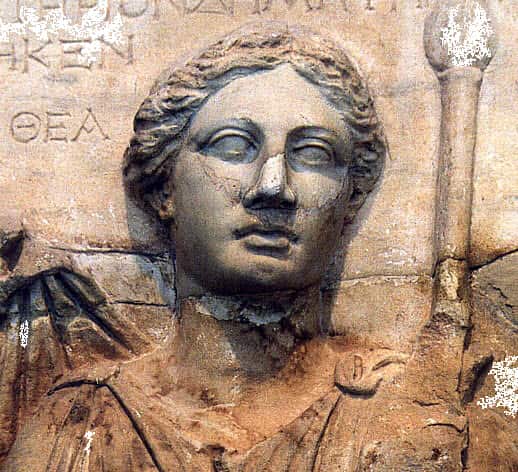
Theia, the eldest daughter of Uranus and Gaia, was associated with sight and precious metals. She is also known as Euryphaessa and is believed to add value to gems, gold, silver, and even stones.
She married her brother Hyperion and was the mother of three children Helios, Eos, and Selene. All three have been associated with the Sun, the Dawn, and the Moon.
Her son, Helios, would ride on a blazing fire that would drag the Sun all across the Sky, and Eos would travel before the arrival of his brother, Helios. Selene would travel in a chariot with the Moon at night.
She would represent the Sun, the Dawn, the Moon, the Sight, and her three children.
5. Rhea – Titaness of Fertility, the flow of time, and mountains
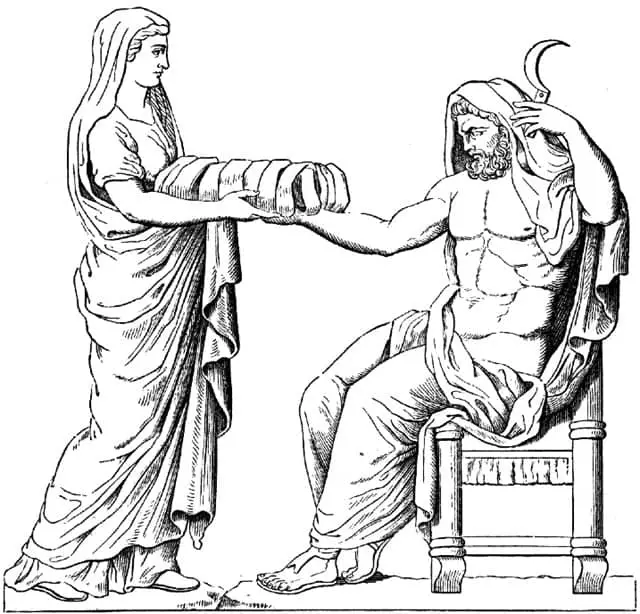
Rhea, the Titaness of Fertility, time flow, and mountains, were Uranus and Gaia’s second daughter. She married her brother, Cronus, and was mother to six children Hestia, Zeus, Hera, Demeter, Poseidon, and Hades.
She was the queen of the Titans and the bravest Titaness of all as she managed to save her child Zeus by fooling her husband, Cronus, by giving him a stone instead of Zeus.
If not done so, Cronus would have swallowed Zeus like all his children in fear of losing his throne to his children.
Rhea gave Zeus to her sister Tethys to keep him safe, and when Zeus grew up, he came back and forced his father to vomit all swallowed siblings. Her brave acts and wise moves made her famous amongst the Olympian gods, and they depended on her to solve their affairs.
She would give good advice on proper parenting and counsel the children in need.
4. Themis – Titaness of Divine law and Prophecy
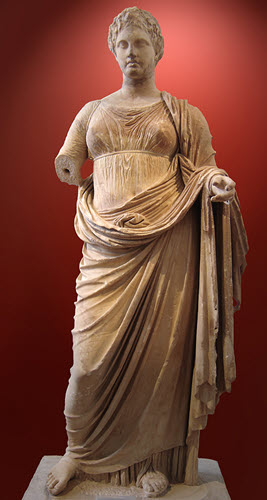
Themis, daughter of Uranus and Gaia, was the Titaness of divine law and prophecy. She is also described as the lady of Good Counsel and organizer of the communal affairs of humans, primarily assemblies.
She had extraordinary power to foresee the future and had helped a lot by giving proper advice and justice to the needy ones. She would always advise and maintain balance with appropriate justice.
Due to her balanced nature, she was depicted holding a pair of balancing scales in one hand and a sword in another. She and Greek Goddess Nemesis worked together and provided rules to the men about how they should lead their lives.
Themis issued the laws and rules, whereas Nemesis ensured the laws were being followed. Her husband, Zeus, would also help her make laws and orders. She was the second wife of Zeus and mother to Moirai – the fates and Horae – the hours.
Gaia was impressed with Themis’s work, so she awarded her with the Oracle of Delphi, which was later passed on to Phoebe and Apollo.
3. Mnemosyne – Titaness of Memory and Language
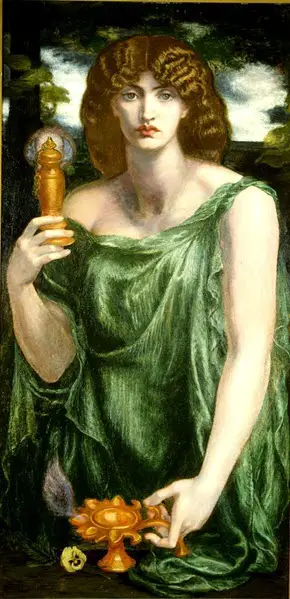
Mnemosyne, the Titaness of Memory and Language, was the daughter of Uranus and Gaia. Her name ‘Mnemosyne’ meant Memory or Remembrance.
She was paired up with Zeus and had nine Muses conceived after sleeping together for nine consecutive nights. However, she and Zeus were not married to each other.
The nine muses were Clio, Calliope, Euterpe, Erato, Polymnia, Ourania, Melpomeni, Thalia, and Terpischore.
Mnemosyne was one of the minor worshipped goddesses in Ancient Greece and is depicted mostly alongside her daughters – the Muses. Her statue was placed alongside Zeus, Muses, and Apollo in the shrine of Dionysos in Athens, the city of Athena.
2. Phoebe – Titaness of the bright and intellect
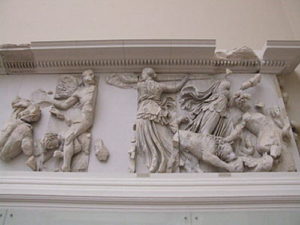
Phoebe, the daughter of Uranus and Gaia, was associated with brightness and intellect. She married her brother Coeus and was the mother of two daughters, Leto and Asteria.
Her daughters were not the titans but the olympian goddesses. Leto was worshipped by the Greeks and was associated with motherhood, fertility, and modesty. Whereas Asteria was the Goddess of stars, she too was honored by the Greeks.
Phoebe was one of the daughters who received the Oracle of Delphi from Themis, which she passed to Apollo. She is symbolized with the Oracle of Delphi after receiving it.
Apart from this symbol, she is also responsible for the brightness all over, as her name signifies brightness. The Romans also honor her as she is the Greek counterpart of the Roman deity, Diana.
1. Tethys – Titaness of Nursing and freshwaters
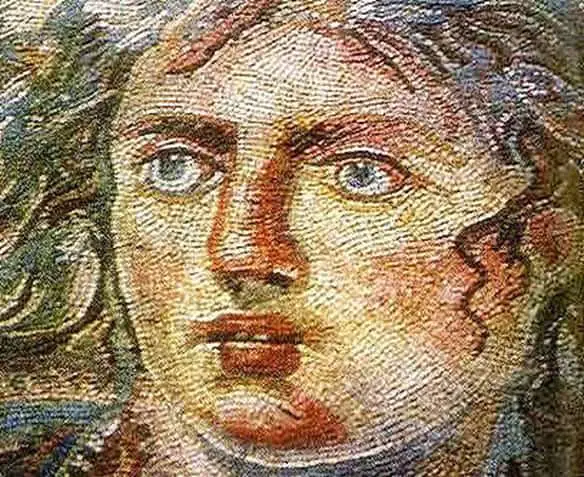
Tethys, the youngest daughter of Heaven god Uranus and Earth goddess Gaia was associated with freshwater and nursing. She was married to his brother, Oceanus, and was the mother of 6000 children. Out of which, 3000 were sons, and the remaining 3000 were daughters.
When Rhea saved Zeus from his father, Cronus, she sent Zeus to Tethys to be kept safe. Tethys took care of Zeus until he returned to take revenge on Cronus.
Though she was not the mother to have given birth to Zeus, she raised him like his mother and kept him safe from danger.
She was honored and respected by Greeks for nursing and caring for people in need. She decorated the pools along with her husband, Oceanus.
Conclusion
The Titans and Titaness mentioned above are associated with higher powers and have effectively fulfilled their associations.
Some have been sent to the bottomless pit, while some have joined the Olympians gods and are honored even today.
However, all these Titans have played a vital role in Greek Religion and unique place in Ancient Greek legend.

